- Home
- Truman Capote
The Early Stories of Truman Capote Page 2
The Early Stories of Truman Capote Read online
Page 2
Neatly he piled the wood while Jake cut strips of bacon and put them in a grease-coated pan. Then, when the wood was ready to be fired, he searched through his overalls for a match.
“Damn it, where did I put those matches? Where are they, you ain’t got ’em, have you, kid? Nuts, I didn’t think so; ah, here they are.” He drew a paper of matches from a pocket, lit one, and protected the tiny flame with his rough hands.
Tim put the pan with the bacon over the small fire that was rapidly catching. The bacon remained still for a minute or so and then a tiny crackling sound started, and the bacon was frying. A very rancid odor came from the meat. Tim’s sick face turned sicker from the fumes.
“Gee, Jake, I don’t know whether I can eat any of this junk or not. It doesn’t look right to me. I think it’s rancid.”
“You’ll eat it or nothin’. If you weren’t so stingy with that piece of change you got, we could a got us somethin’ decent to eat. Why, kid, you got a whole ten bucks. It doesn’t take that much to get home on.”
“Yes, it does, I’ve got it all figured out. The train fare will cost me five bucks, and I want to get a new suit for about three bucks, then I want to git Ma somethin’ pretty for about a dollar or so; and I figure my food will cost a buck. I want to git lookin’ decent. Ma an’ them don’t know I been bummin’ around the country for the last two years; they think I’m a traveling salesman—that’s what I wrote them; they think I’m just coming home now to stay a while afore I start out on a little trip somewhere.”
“I ought to take that money off you—I’m mighty hungry—I might take that piece of change.”
Tim stood up, defiant. His weak, frail body was a joke compared to the bulging muscles of Jake. Jake looked at him and laughed. He leaned back against a tree and roared.
“Ain’t you a pretty somethin’? I’d jes’ twist that mess of bones you call yourself. Jes’ break every bone in your body, only you been pretty good for me—stealin’ stuff for me an’ the likes of that—so I’ll let you keep your pin money.” He laughed again. Tim looked at him suspiciously and sat back down on a rock.
Jake took two tin plates from a sack, put three strips of the rancid bacon on his plate and one on Tim’s. Tim looked at him.
“Where is my other piece? There were four strips. You’re supposed to get two an’ me two. Where is my other piece?” he demanded.
Jake looked at him. “I thought you said that you didn’t want any of this rancid meat.” Putting his hands on his hips he said the last eight words in a high, sarcastic, feminine voice.
Tim remembered, he had said that, but he was hungry, hungry and cold.
“I don’t care. I want my other piece. I’m hungry. I could eat just about anything. Come on, Jake, gimme my other piece.”
Jake laughed and stuck all the three pieces in his mouth.
Not another word was spoken. Tim went sulkily over in a corner, and, reaching out from where he was sitting, he gathered pine twigs, neatly laying them along the ground. Finally, when this job was finished, he could stand the strained silence no longer.
“Sorry, Jake, you know how it is. I’m excited about getting home and everything. I’m really very hungry too, but, gosh, I guess all there is to do is to tighten up my belt.”
“The hell it is. You could take some of that jack you got and go get us a decent meal. I know what you’re thinkin’. Why don’t we steal some food? But hell, you don’t catch me stealin’ anything in this burg. I heard from buddies that this place,” he pointed a finger toward the lights that indicated a town, “is one of the toughest little burgs this side of nowhere. They watch bums like eagles.”
“I guess you’re right, but you understand, I just ain’t goin’ to take any chances on losin’ none of this dough. It’s got to last me, ’cause it’s all I got an’ all I’m liable to get in the next few years. I wouldn’t disappoint Ma for anything in the world.”
Morning came gloriously, the large orange disc known as the sun came up like a messenger from heaven over the distant horizon. Tim had awakened just in time to see the sunrise.
He shook Jake, who jumped up demanding: “What do you want? Oh! it’s time to get up. Hell, how I hate to get up.” Then he let out a mighty yawn and stretched his powerful arms as far as they would go.
“This is shore goin’ to be one hot day, Jake. I shore am glad I ain’t goin’ to have to walk. That is, only as far back into that town as the railroad station is.”
“Yeh, kid. Think of me, I ain’t got any place to go, but I’m goin’ there, just walkin’ in the hot sun. I wish it would always be like early spring, not too hot, not too cold. I sweat to death in summer and freeze in winter. It’s a heck of a climate. I think I’d like to go to Florida in the winter, but there ain’t no good pickins there anymore.” He walked over and started to take out the frying utensils again. He reached into the pack and brought out a bucket.
“Here, kid, go up there to that farm house about a quarter of a mile up the road and git some water.”
Tim took the bucket and started up the road.
“Hey, kid, ain’t you goin’ to take your jacket? Ain’t you afraid I’ll steal your dough?”
“Nope. I guess I can trust you.” But down deep in his heart he knew that he couldn’t. The only reason he hadn’t turned back was because he didn’t want Jake to know that he didn’t trust him. The chances were that Jake knew it anyway.
Up the road he trudged. It was not paved, but even in the early morning the dust still stuck. The white house was just a little bit farther. As he reached the gate, he saw the owner coming out of the cow shed with a pail in his hand.
“Hey, Mister, can I please have this bucket filled with some water?”
“I guess so. There’s the pump.” He pointed a dirty finger toward a pump in the yard. Tim went in. He grasped the pump-handle and pushed it up and down. Suddenly the water came spilling out in a cold stream. He reached down and stuck his mouth to the spout and let cold liquid run in and over his mouth. After filling the bucket he started back down the road.
He broke his way through the brush and came back into the clearing. Jake was bending over the bag.
“Damn, they jes’ ain’t nothin’ left to eat. I thought, at least, there were a couple of slices of that bacon left.”
“Aw, that’s all right. When I get to town I can get me a whole meal—an’ maybe I’ll buy you a cup of coffee—an’ a bun.”
“Gee, but you’re generous.” Jake looked at him disgustedly.
Tim picked up his jacket and reached in the pocket. He brought out a worn leather wallet and unfastened the catch.
“I’m about to produce the dough that’s goin’ to take me home.” He repeated the words several times, caressing it each time.
He reached into the wallet. He brought out his hand—empty. An expression of horror and unbelief overcame him. Wildly he tore the wallet apart, then dashed about looking through the pine needles. Furiously he ran around like a trapped animal—then he saw Jake. His small thin frame shook with fury. Wildly he turned on him.
“Give me back my money, you thief, liar, you stole it from me. I’ll kill you if you don’t give it back. Give it back! I’ll kill you! You promised you wouldn’t take it. Thief, liar, cheat! Give it to me, or I’ll kill you.”
Jake looked at him astounded and said, “Why, Tim, kid, I ain’t got it. Maybe you lost it, maybe it’s still in those pine needles. Come on, we’ll find it.”
“No, it’s not there. I’ve looked. You stole it. There jes’ ain’t anybody else who could of. You did it. Where did you put it? Give it back, you got it….give it back!”
“I swear I haven’t got it. I swear it by all the principles I got.”
“You ain’t got no principles. Jake, look me in the eyes and say you hope you get killed if you ain’t got my money.”
Jake turned around. His red hair seemed even redder in the bright morning light, his eyebrows more like thorns. His unshaven chin jutted out, and his y
ellow teeth showed at the far end of his upturned and twisted mouth.
“I swear that I ain’t got your ten bucks. If I ain’t tellin’ the truth, I hopes that the next time I rides the rail I gets killed.”
“Okay, Jake, I believe you. Only where could my money be? You know I ain’t got it on me. If you ain’t got it, where is it?”
“You ain’t searched the camp yet. Look all ’round. It must be here somewheres. Come on, I’ll help you look. It couldn’ of walked off.”
Tim ran nervously about, repeating: “What if I don’t find it? I can’t go home, I can’t go home lookin’ like this.”
Jake went about the search only half heartedly, his big body bending and looking in the pine needles, in the sack. Tim took off his clothes and stood naked in the middle of the camp, tearing out the seams in his overalls searching for his money.
Near tears, he sat down on a log. “We might as well give it up. It ain’t here. It ain’t nowheres. I can’t go home, and I want to go home. Oh! what will Ma say? Please, Jake, have you got it?”
Damn, you, for the last time NO! The next time you ask me that I’m agoin’ to knock hell out o’ you.”
“Okay, Jake, I guess I’ll just have to bum around with you some more—’till I can get me enough money again to go home on—I can write Ma a card an’ say that they sent me off on a trip already, an’ I can come see her later.”
“I shore ain’t goin’ to have you bummin’ ’round with me anymore. I’m tired of kids like you. You’ll have to go your own way an’ find y’r own pickins.”
Jake mused to himself. “I want the kid to come with me, but I shouldn’. Maybe if I leave him alone, he’ll get wise an’ go home an’ make somethin’ of himself. That’s what he ought to do, go home an’ tell the truth.”
They both sat down on a log. Finally Jake said, “Kid, if you are goin’ you better get started. Come on, get up, it’s about seven already, an’ got to get started.”
Tim picked up his knapsack, and they walked out to the road together. Jake’s big powerful figure looked fatherly beside Tim. It seemed as if he might be protecting a small child. They reached the road and turned to face each other to say goodbye.
Jake looked into Tim’s clear, watery blue eyes. “Well, so long, kid, let’s shake hands an’ part friends.”
Tim extended his tiny hand. Jake wrapped his paw over Tim’s. He gave him a hearty shake—the kid allowed his hand to be moved limply. Jake let go—the kid felt a something in his hand. He opened it, and there lay the ten dollar bill. Jake was hurrying away, and Tim started after him. Perhaps it was just the bright sunlight reflecting on his eyes—and then again—perhaps it really was tears.
Mill Store
The woman gazed out of the back window of the Mill Store, her attention rapt upon the children playing happily in the bright water of the creek. The sky was completely cloudless, and the southern sun was hot on the earth. The woman wiped the sweat off her forehead with a red handkerchief. The water, rushing rapidly over the bright creek bottom pebbles, looked cold and inviting. If those picnickers weren’t down there now, she thought, I swear I’d go and sit in that water and cool myself off. Whew—!
Almost every Saturday people would come from the town on picnic parties and spend the afternoon feasting on the white pebbled shores of Mill Creek, while their children waded in the semi-shallow water. This afternoon, a Saturday late in August, there was a Sunday school picnic in progress. Three elderly women, Sunday school teachers, rushed about the shady spot, anxiously tending their young charges.
The woman, watching from the Mill Store, turned her gaze back into the comparatively dark interior of the store and searched around for a pack of cigarettes. She was a big woman, dark and sunburned. Her black hair was thick but cut short. She was dressed in a cheap calico dress. As she lighted her cigarette she frowned over the smoke. She twisted her mouth and grimaced. That was the only trouble with this damn smoking; it hurt the ulcers in her mouth. She inhaled sharply, the suction easing the stinging sores for the moment.
It must be the water, she thought. I ain’t used to drinkin’ this well water. She had only come to the town three weeks ago, looking for a job. Mr. Benson had given her the job, a chance to work in the Mill Store. She didn’t like it here. It was five miles to the town, and she wasn’t exactly prone to walking. It was too quiet, and at night, when she heard the crickets chirping and the bull frogs croaking their lonely cry, she would get the “jitters.”
She glanced at the cheap alarm clock. It was three-thirty, the loneliest, most interminable hour of the day for her. The store was a stuffy place, smelling of kerosene and fresh cornmeal and stale candies. She leaned back out the window. The August mid-afternoon sun hung hot in the sky.
The store was on a sharp red clay bank that rose straight from the creek. At one side there was a big crumbling mill that no one had used for six or seven years. A rickety, gray wood dam held out the pond waters from the creek which flowed like an opalescent olive ribbon through the woods. The picnickers had to pay a dollar at the store for the use of the grounds and for fishing in the pond above the dam. One day she had gone fishing at the pond but all she had caught were a couple of skinny, bony cat-fish and two moccasins. How she had screamed when she pulled the snakes up, twisting, flashing their slimy bodies in the sun, their poisonous, cotton mouths sunk into her hook. After the second one, she had dropped her pole and line, rushed back to the store and spent the rest of the humid day consoling herself with movie magazines and a bottle of bourbon.
She thought about it as she looked down at the children splashing in the water. She laughed a little, but just the same she was afraid of the slimy things.
Suddenly a shy young voice behind her said, “Miss—?”
She was startled; she jumped around with a fierce look in her eye. “Ya don’t have to sneak—oh, what d’you want, Kid?”
A little girl pointed to an old fashioned glass show case, filled with cheap candies—jelly beans, gum drops, peppermint sticks, jaw-breakers scattered about the case. As the child pointed to each desired article the woman reached in and threw it in a small, brown paper bag. The woman watched the child intensely as she chose her purchases. She reminded her of someone. It was the child’s eyes. They were bright, like bubbles of blue glass. Such a pale, sky blue. The little girl’s hair dipped in waves almost down to her shoulders. It was fine, honey-colored hair. Her legs and face and arms were dark brown, almost too dark. The woman knew the child must have been out in the sun a great deal. She couldn’t help staring at her.
The little girl looked up from her purchasing and asked shyly, “Is something wrong with me?” She looked around her dress to see if it was torn.
The woman was embarrassed. She looked down quickly and began to roll up the end of the bag. “Why, no—no—not at all.”
“Oh, I thought there was because you was looking at me so funny.” The child seemed reassured.
The woman leaned over the counter as she handed the bag to the little girl and touched her hair. She just had to; it seemed so rich, like sweet yellow butter.
“What’s your name, Kid?” she asked.
The child looked frightened. “Elaine,” she said. She grabbed the bag, laid some hot coins on the counter and hurried quickly out of the store.
“Bye, Elaine,” the woman called, but the little girl was already out of the store and hurrying across the bridge to rejoin her playmates.
That’s a helluva thing, she thought. That kid’s eyes are just like his. Those damned eyes. She sat down in a chair in the corner of the store, took one last drag on the cigarette and crushed it lifeless on the bare floor. She pressed her head into her lap and fell into a hot semi-sleep. God, she thought as she dozed, those eyes and, she moaned, these damned ulcers.
She was awakened by four young boys shaking her shoulders and jumping around the store in a frenzy of excitement. “Wake up,” they yelled. “Wake up.”
She looked at them, bleary-eyed fo
r a moment. Her cheeks were hot all over. The ulcers burned in her mouth. She swept them carelessly with her tongue.
“What’sa matter?” she asked, “What’sa matter?”
“Have you got a telephone or a car, Lady, please?” asked one of the excited boys.
“No, no I haven’t,” she said, now fully awake. “What’s the matter? What’s happened? Dam hasn’t burst, has it?”
The boys jumped around. They were too excited to stand still; they just jumped around moaning, “Oh, what are we gonna do! She’ll die, she’ll die!”
The woman was getting mad. “What the hell’s happened, anyway? Tell me, but quick!”
“A kid’s been snake bit,” sobbed a small, chubby boy.
“For God’s sake, where?”
“Down in the creek,” he pointed toward the window.
The woman rushed out the store. Across the bridge she flew and down the pebbled beach. A crowd of people were gathered at the end of the beach. One of the Sunday school teachers was flying around the crowd, yelling her head off. Some of the children stood to one side, wall-eyed with horror and amazement at this thing that had broken up their party.
The woman broke through the crowd and saw the child that lay on the sand. It was the girl with the bubble eyes, like bright blue glass. “Elaine,” cried the woman. Everyone turned their attention on the new arrival. She knelt down beside the child and looked at the wound. Already it was swelling and turning color. The child shivered and wept and hit her head with her hand.
“Haven’t you got a car?” the woman asked one of the school teachers. “How did you get here?”
“We hiked over,” the other woman answered, fear and bewilderment in her eyes.
The woman rang her hands in rage. “Look here,” she said, “this kid’s serious; she’s liable to die.”
They all only stared at her. What could they do? They were helpless, just three silly women and a lot of children.

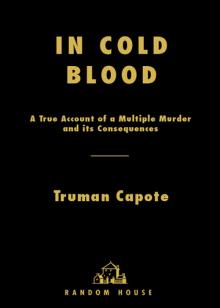 In Cold Blood
In Cold Blood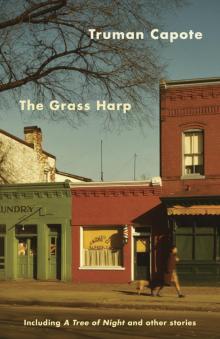 The Grass Harp, Including a Tree of Night and Other Stories
The Grass Harp, Including a Tree of Night and Other Stories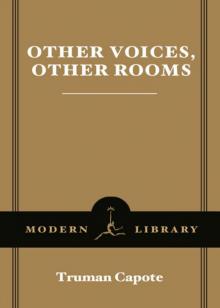 Other Voices, Other Rooms
Other Voices, Other Rooms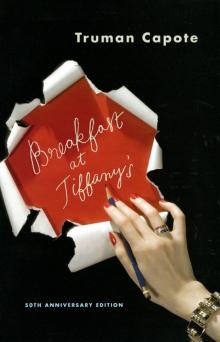 Breakfast at Tiffany's
Breakfast at Tiffany's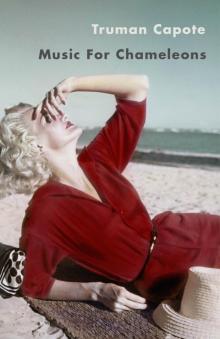 Music For Chameleons
Music For Chameleons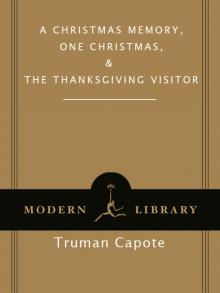 A Christmas Memory, Including One Christmas and the Thanksgiving Visitor
A Christmas Memory, Including One Christmas and the Thanksgiving Visitor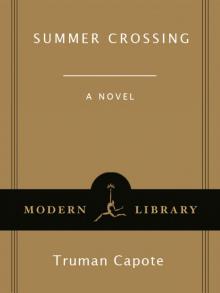 Summer Crossing
Summer Crossing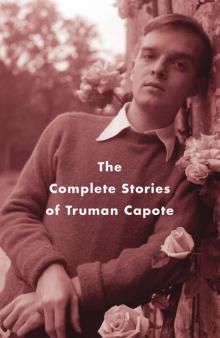 The Complete Stories of Truman Capote
The Complete Stories of Truman Capote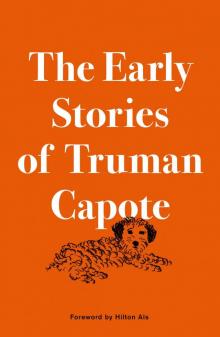 The Early Stories of Truman Capote
The Early Stories of Truman Capote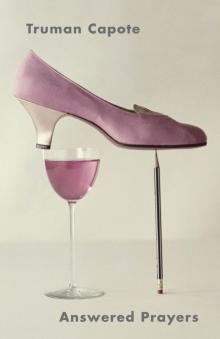 Answered Prayers
Answered Prayers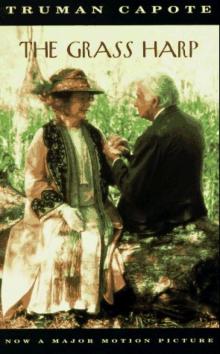 The Grass Harp
The Grass Harp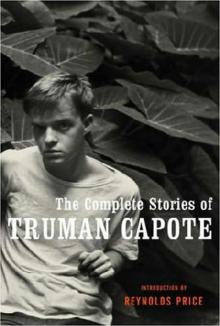 SSC (2004) The Complete Stories of Truman Capote
SSC (2004) The Complete Stories of Truman Capote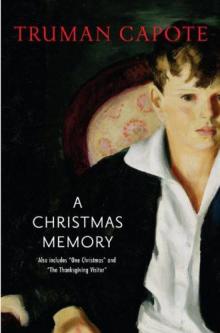 A Christmas Memory
A Christmas Memory